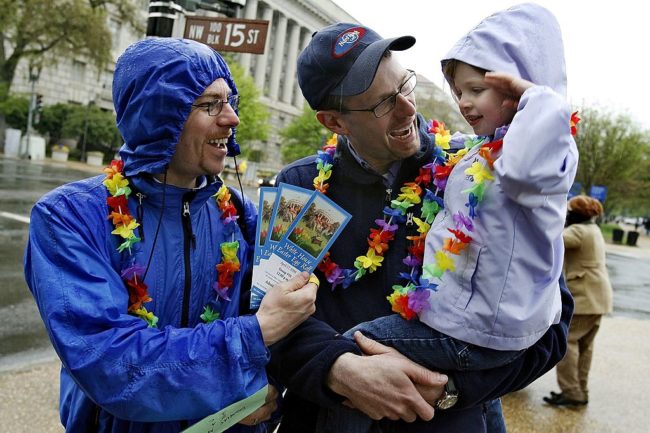Huge increase in UK same-sex couples seeking IVF and surrogates

LILLIAN SUWANRUMPHA/AFP/Getty
New statistics released this week suggest that there has been a huge increase in same-sex couples seeking IVF treatment and surrogates in the UK in recent years.
A report from government agency the Human Fertilisation & Embryology Authority (HFEA) revealed that there was a 12 percent increase in female same-sex couples seeking IVF treatment between 2016 and 2017.
Meanwhile, treatment for surrogates rose by 22 percent in the same period.
Fertility treatments have come ‘a long way’
The significant majority of people seeking IVF treatment continues to be opposite-sex couples. However, 5.9 percent of the people seeking fertility treatment reported having a female partner, and 0.4 percent of all IVF cases were for surrogates.
Chair of the HFEA, Sally Cheshire, said that fertility treatments have come “a long way” in the UK and now help more people than ever to create “much longed for families.”
“We are seeing a gradual change in the reasons why people use fertility treatments, which were originally developed to help heterosexual couples with infertility problems.”
– Sally Cheshire, Chair of the HFEA
“We are seeing a gradual change in the reasons why people use fertility treatments, which were originally developed to help heterosexual couples with infertility problems,” Cheshire said.
“While the increases in same-sex couples, single women and surrogates having fertility treatment are small, this reflects society’s changing attitudes towards family creation, lifestyles and relationships and highlights the need for the sector to continue to evolve and adapt.”

Chip Somodevilla/Getty
The organisation also noted that surrogacy is popular among male same-sex couples who want to build a family. Surrogacy activists in the UK have welcomed the news that more people in the UK are opting for the method, according to Reuters.
“It’s great that clinics are seeing demand for IVF from intended fathers because it’s needed,” TwoDads.U.K. co-founder Michael Johnson-Ellis told the news outlet.
There has been a general increase in the number of people seeking IVF treatment
The report also showed a general increase in the number of people undergoing IVF treatment, and showed that the procedure is becoming safer and more successful than ever.
It also revealed that more single women are seeking IVF treatment across the UK.
Furthermore, rates of multiple births are reducing in IVF cases, news which the government agency has welcomed.
“We know that multiple births carry higher risks to mothers and babies and cost more to the NHS,” Cheshire said.
“That’s why, it is a great achievement that all our hard work with fertility clinics has paid off as we have now achieved the lowest ever multiple birth rate while continuing to see success rates rise.
“However, good treatment is more than just providing successful outcomes. That’s why we are continuing to work with clinics to ensure they address the emotional aspects of fertility treatment by providing excellent patient support, alongside high-quality care.”

